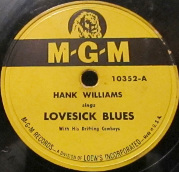
Hiram "Hank" Williams was an American singer-songwriter. He is regarded as one of the most significant and influential American singers and songwriters of the 20th century. Williams recorded 55 singles that reached the top 10 of the Billboard Country & Western Best Sellers chart, five of which were released posthumously, and 12 of which reached No.1.

"Your Cheatin' Heart" is a song written and recorded by country music singer-songwriter Hank Williams in 1952. It is regarded as one of country's most important standards. Williams was inspired to write the song while driving with his fiancée from Nashville, Tennessee, to Shreveport, Louisiana. After describing his first wife Audrey Sheppard as a "cheatin' heart", in minutes he dictated the lyrics to Billie Jean Jones. Produced by Fred Rose, Williams recorded the song at his last session at Castle Studio in Nashville, Tennessee, on September 23.
"Jambalaya (On the Bayou)" is a song written and recorded by American country music singer Hank Williams that was first released in July 1952. It is Williams' most recorded song. Named for a Creole and Cajun dish, jambalaya, it spawned numerous recordings and has since achieved popularity in several different music genres.

The Drifting Cowboys were the backing group for American country legend and singer-songwriter Hank Williams. The band went through several lineups during Williams' career. The original lineup was formed in 1937, changing musicians from show to show until Williams signed with Sterling Records.

"Hey, Good Lookin'" is a 1951 song written and recorded by Hank Williams, and his version was inducted into the Grammy Hall of Fame in 2001. In 2003, CMT voted the Hank Williams version No. 19 on CMT's 100 Greatest Songs of Country Music. Since its original 1951 recording it has been covered by a variety of artists.

"Lovesick Blues" is a Tin Pan Alley song, composed by Cliff Friend, with lyrics by Irving Mills. It first appeared in the 1922 musical "Oh, Ernest", and was recorded that year by Elsie Clark and Jack Shea. Emmett Miller recorded it in 1925 and 1928, followed by country music singer Rex Griffin in 1939. The recordings by Griffin and Miller inspired Hank Williams to perform the song during his first appearances on the Louisiana Hayride radio show in 1948. Receiving an enthusiastic reception from the audience, Williams decided to record his own version despite initial push back from his producer Fred Rose and his band.

"Kaw-Liga" is a country music song written by Hank Williams and Fred Rose.

Audrey Mae Sheppard Williams was an American musician known for being the first wife of country music singer and songwriter Hank Williams, the mother of Hank Williams Jr. and the grandmother of Hank Williams III and Holly Williams.
"Why Don't You Love Me" is a song by American singer and guitarist Hank Williams. The song reached number one on the U.S. Country & Western chart. It was released as a single in 1950 with the B-side, "A House Without Love".
Billie Jean Horton is an American country-music singer-songwriter and music promoter. She had high profile marriages, first to country musician and singer-songwriter Hank Williams in 1952 until 1953 and subsequently to singer Johnny Horton from 1953 until 1960.

Hank Williams' discography is composed of 31 singles and 2 ten-inch LPs released during his six-year career; as well as posthumous work including: singles, compilation albums and previously unreleased material. During his lifetime, Williams placed 30 songs on Billboard's Top C&W Records, while he had eleven number one hits.
"Take These Chains from My Heart" is a song by Hank Williams. It was written by Fred Rose and Hy Heath and was recorded at Williams' final recording session on September 23, 1952, in Nashville. The song has been widely praised; Williams' biographer Colin Escott deems it "perhaps the best song [Rose] ever presented to Hank...It was one of the very few songs that sounded somewhat similar to a Hank Williams song." Williams is backed by Tommy Jackson (fiddle), Don Helms, Chet Atkins, Jack Shook, and Floyd "Lightnin'" Chance (bass). In the wake of Williams' death on New Year's Day, 1953, the song shot to No. 1, his final chart-topping hit for MGM Records. Like "Your Cheatin' Heart," the song's theme of despair, so vividly articulated by Williams' typically impassioned singing, reinforced the image of Hank as a tortured, mythic figure.
"You Win Again" is a 1952 song by Hank Williams. In style, the song is a blues ballad and deals with the singer's despair with his partner. The song has been widely covered, including versions by Ray Charles, Jerry Lee Lewis, Roy Orbison, the Grateful Dead, Charley Pride, Bob Dylan, and the Rolling Stones.
"Mind Your Own Business" is a 1949 song written and originally performed by Hank Williams.
"A Mansion on the Hill" is a song written by Hank Williams and Fred Rose and originally recorded by Williams on MGM Records. It peaked at No. 12 on the Most Played Jukebox Folk Records chart in March 1949.
"You're Gonna Change (Or I'm Gonna Leave)" is a song written by Hank Williams. It was released as a single on MGM Records in September 1949 and reached #4 on the Best Selling Retail Folk Records chart.
"I Just Don't Like This Kind of Living" is a song written by Hank Williams and released as his thirteenth single on MGM Records in January 1950. The song peaked at #5 on the Best Selling Retail Folk Records chart.
"I'll Be a Bachelor 'Til I Die" is a song written and recorded by Hank Williams on MGM Records.
"I Won't Be Home No More" is a song recorded by Hank Williams on July 11, 1952. It was released posthumously on MGM Records a year later in July 1953. The song climbed to No. 4 on the US Billboard National Best Sellers chart.
"Please Make Up Your Mind" is a song written and recorded by Hank Williams and released as a "Luke the Drifter" single in 1952.







